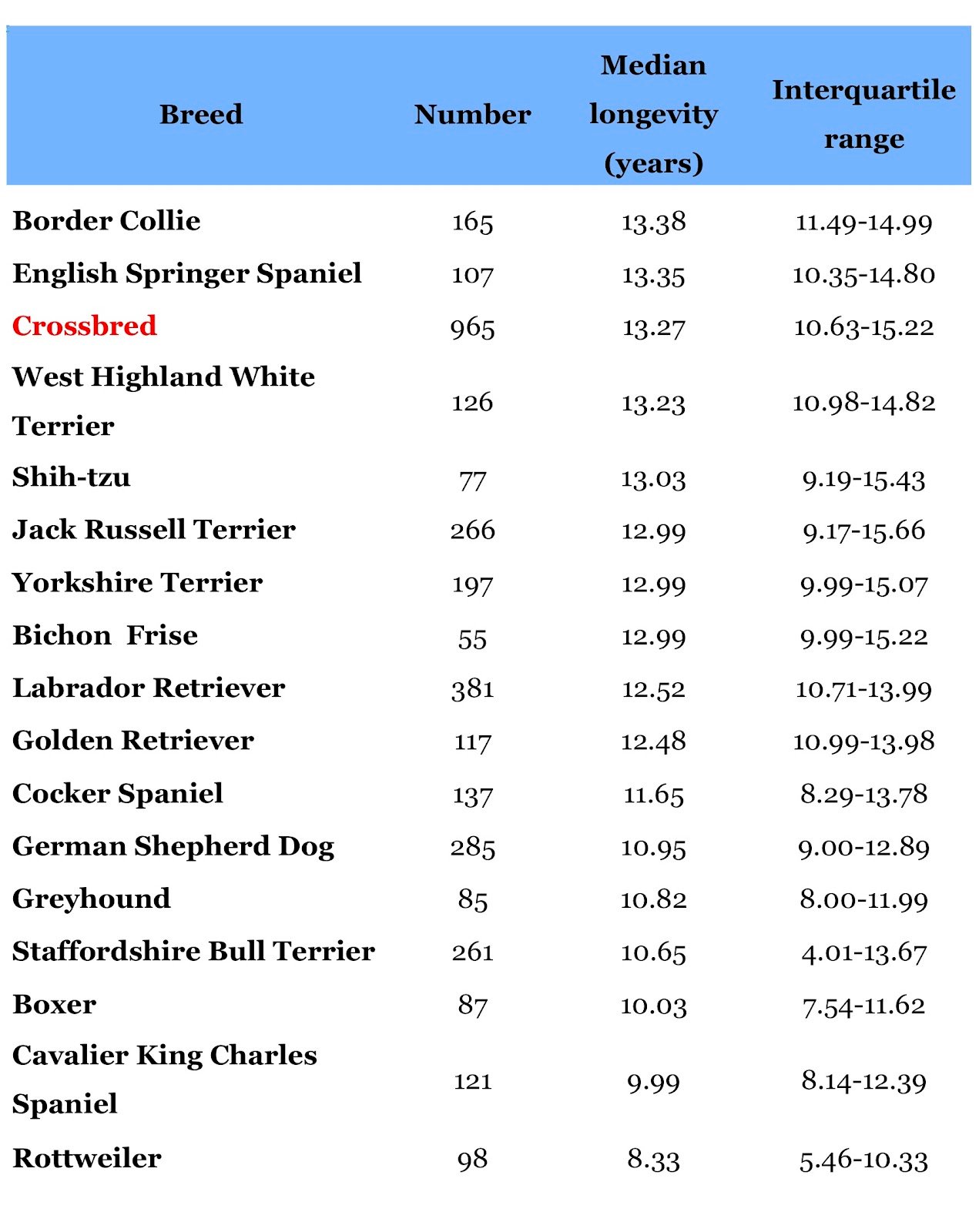There's a question that every new or current dog owner will occasionally worry about: how long do dogs live? Many of us neurotic types begin to get consumed with the thoughts of losing our dear friend much too early, but the truth is that there's no way to tell for sure how long your dog will live.
Even though there's no definite answer to the question of how long do dogs live, if you account for a number of variables, there is a way to make an educated guess. Many dog experts have already pinpointed the average number of years to go by, and below I'll explain how they come to this conclusion.
So, in the grand scheme of things, every loving pet parent can deal with a lot of things that come once you adopt a puppy. You'll have to be okay with the messes, dog's behavioral problems and the unexpected vet visits, continuous vet checkups, early morning and late night walks, having to buy special dog food brands and a plethora dog toys.
All of the “problems” and the hassle that comes with owning a dog is usually nothing as compared to the sad fact that humans live much longer than dogs. As a pet parent, you probably know that occasionally, this thought breaks your heart. Thinking about that inevitable circumstance is what drives many of us to ask the question, how long do dogs live, actually? It’s a good question.
How Long Do Dogs Live: Dog's Life Expectancy
How to know how long will your dog live
There are very few dog owners who would ever disagree that owning a dog takes work, time, and money. But many of them will also agree that all of that is absolutely worth it, and you also receive so much more out of this relationship than many of the relationships you'll have with humans.
Unfortunately, just as with humans, there is no easy way to answer the question of how long do dogs live and point you in the direction of the exact number of years. However, there are average life spans calculated based on the most common dog breeds.
In addition, some other factors can help an expert to guesstimate your own dog’s lifespan by taking into account many different variables, such as your dog's weight, diet, heredity, breed, body size and much more.
Small dogs live longer than large breeds
 Multiple studies have shown, and most dog experts agree with the general rule that small breed dogs live longer than large breeds. However, just as with everything else, there are always exceptions to every rule, so do not panic yet if you own a Great Dane.
Multiple studies have shown, and most dog experts agree with the general rule that small breed dogs live longer than large breeds. However, just as with everything else, there are always exceptions to every rule, so do not panic yet if you own a Great Dane.
More importantly, always remember that you can help to extend your canine’s lifespan by ensuring a healthy lifestyle. There are many things a dog owner can do in order to ensure a healthy life for the pet, and this usually begins with proper diet, supplementation and exercise routine.
Check out our articles that will apply here:
- Vet Recommended Dog Food Brands
- How to Improve Quality of Life for Disabled Dogs
- Vet’s Tips on How to Care for Senior Dogs
- Improving Quality of Life for Senior Dogs
- Vet Recommended Safe Dog Treats for Snacking
- Vet Recommended Supplements for Dogs
Back to the topic.
Typically, the larger the dog – the shorter is his lifespan. That's what current research and dog experts have concluded. It's because they've noticed that breeds with the shortest life expectancy include very large breeds, such as:
- Great Danes
- Irish Wolfhounds
- Bernese Mountain Dogs
- Bloodhounds
- Bullmastiffs
The dog breeds above and those similar in size have an average lifespan of about 6-8 years, although it’s not unheard of for them to reach 10 or 12 years (but that is much less common).
Small dog breeds will have a longer lifespan, and those include breeds such as:
- Yorkshire Terriers
- Chihuahuas
- Havanese
- Miniature Schnauzer
These dog breeds have an average lifespan of about 14 years, and some live to be as old as 20.
In fact, it’s not that uncommon for toy dog breeds to live 20+ years.
There's a reason why bigger dogs don't live as long. Large dog breeds carry more weight and their bodies need to work harder to cope with their size. Because of this, their bodies deteriorate faster and they begin to show signs of bone disease, canine arthritis, fatigue, weakened heart muscles, and other health issues much sooner than smaller dogs.
However, it's possible that we can see a brighter future for our dogs, just as humans have increased their own life expectancy. Maybe with the improvement of dog supplementation, vitamins and other health related products; ensuring a healthy natural diet for the dog and research finding more answers to dog's life expectancy question, we'll have dogs that live to 30 years.

Importance of dog genetics
Whether proper dog diet and supplements would help to increase dog's life expectancy or not remains to be seen. However, there are other factors affecting our pet canines' lifespan. When it comes to answering the question of how long do dogs live, much like with humans, genetics play a large role in the lifespan of a dog.
RELATED: Canine Genetics – How to Make a Dog
There are some breeds that are more susceptible to certain diseases than other breeds. For example, Boxers, Doberman Pinchers, and Cavaliers are more prone to early-onset heart disease. Breeds like Standard Poodles, Great Danes, German Shepherds, and Akitas are at a higher risk of passing from bloat.
Even though there’s an argument against mutts and adoption still going on, the fact is that many purebred dogs are more susceptible to heredity diseases, which is why cross-breeds usually have a longer lifespan than a purebred that is equivalent in size and weight. This has been shown in multiple studies with studies.
Take a look at this chart from Vetcompass below:

Other factors that impact how long do dogs live
On top of what has already been said, dog's breed and dog's genes, there may be other things that affect how long your dog will live. For instance, female dogs tend to live an average of two years longer than male dogs. This is an interesting little fact, because the same is true for humans: women live longer than men.
 We've already discussed the “uncommonly mentioned” factors that include dog's longevity, which are your canine's diet, whether your dog is currently obese or not, your dog's general lifestyle, the amount of exercise he gets, what healthcare he's receiving, and whether or not your dog has been spayed or neutered.
We've already discussed the “uncommonly mentioned” factors that include dog's longevity, which are your canine's diet, whether your dog is currently obese or not, your dog's general lifestyle, the amount of exercise he gets, what healthcare he's receiving, and whether or not your dog has been spayed or neutered.
Even something as simple as housing and how you housebreak your canine can affect how long your dog will live. According to some opinions, dogs that are kept primarily outside may not live as long as dogs that are inside the house, but there's no scientific evidence to support such claims. However, just like with humans, environmental factors in your home or your geological region definitely can add to or take away from your dog’s lifespan.
In the end, there’s no need to ask yourself daily the question of how long do dogs live – you'll drive yourself crazy. The only cause for concern for pet parents is how they feed their dogs, how much exercise they provide their dogs with, whether or not those dogs are being regularly socialized. There are many things to take care of to provide a happy, healthy lifestyle for your canine and ultimately for you, too.
Here's a few helpful articles that you may find useful and interesting on related subjects:














